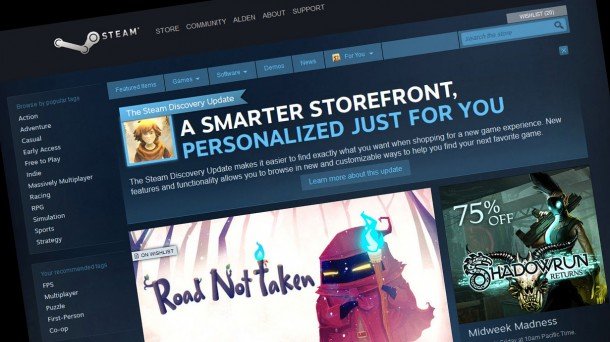Big changes to Steam: 'Discovery Update' adds curators, recommendations, and hides unpopular new releases

The Steam homepage finally has a new look! A very slightly different, bluer new look! OK, it looks about the same, but the functional changes in today's 'Discovery Update' are really big.
The update introduces a "smarter" homepage which recommends games based on past purchases, what you've been playing, and friends' recommendations. Personalized recommendations are obviously a huge deal to services and stores like Netflix and Amazon, so it's a little surprising that it's taken Steam so long to implement it. But here we go.
Further addressing the problem of figuring out which games to buy, the update also lets you follow ' Steam Curators .' Curators can be any individual or organization who has opinions about games and wants to share them, and Steam now offers a nice page where they can organize their recommendations. Following a curator (you can find them here ) will also send their recommendations to your home page
To become a curator , you need to create a group, or already be an officer or moderator in a group. It occurred to us that recommending games is something we do a lot of, so we've gone and tested the feature out: here's our curator page . We'd be honored if you followed us.
Those are the biggest additions to Steam today, but there are several other changes, including an updated search tool. As I looked through the changelog, this one also stuck out to me:
- Changed 'New Releases' to 'Popular New Releases' to filter out less popular titles and provide a more functional release list.
One of Steam's biggest problems right now is the huge number of games being released. How do you present so many new games to users, and how do you deal with the fact that some of them are very, very bad ? This change feels like an effort by Valve to have the best of both worlds: spend less energy deciding who can publish what on Steam, but make sure customers only see popular games unless their preferences (games played, curators followed) dictate otherwise.
I don't think this is doom for little games on Steam. The new 'discovery queue' only shows "the most popular new releases," and 'new releases' is now 'popular new releases,' but scrolling to the bottom of the homepage now reveals the 'recommendation feed.' My feed currently includes Ys Origin and Thomas Was Alone, and the list goes on and on as you scroll. Valve says the feature "helps to make sure you don't miss that interesting indie title that's unlike anything you've played so far, or that awesome adventure game that you missed from last year." If all this is effective, niche games should benefit by being shown to the players most likely to play them. That's my hope.
The biggest gaming news, reviews and hardware deals
Keep up to date with the most important stories and the best deals, as picked by the PC Gamer team.
There are a lot more changes—you can now customize lists to filter out Early Access and other types of games, for instance—and you can read the full changelist here . Regarding the new look, Valve preempted my joke about it being bluer:
- Updated the visual design, layout and typography of the store to reflect a more contemporary Steam brand direction (also commonly referred to as “Making the store blue”).

Tyler grew up in Silicon Valley during the '80s and '90s, playing games like Zork and Arkanoid on early PCs. He was later captivated by Myst, SimCity, Civilization, Command & Conquer, all the shooters they call "boomer shooters" now, and PS1 classic Bushido Blade (that's right: he had Bleem!). Tyler joined PC Gamer in 2011, and today he's focused on the site's news coverage. His hobbies include amateur boxing and adding to his 1,200-plus hours in Rocket League.

